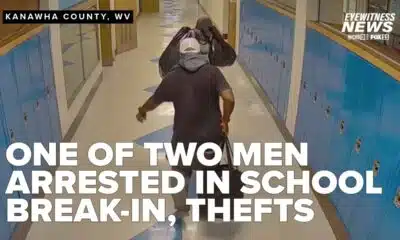News from the South - North Carolina News Feed
Elections in NC suffer from lack of money and little voter education
Upon further review: Commission finds that NC elections suffer from deficits and distrust
James Hardaway spent Election Night counting ballots in Wake County. With another poll worker standing behind him as a second pair of eyes, Hardaway physically checked each paper ballot, ensuring that the numbers matched those the precinct’s tabulators had been tracking all day and night. In other elections across North Carolina, similar scenes were playing out.
Afterwards, the Wake County precinct workers knew “beyond a shadow of a doubt” that the numbers aligned, Hardaway said.
But not everyone shared that knowledge.
“That’s not good enough for someone who’s reading something on Facebook or Twitter that there are 500,000 voted ballots that are only voting for one candidate,” Hardaway said. “If you look at the raw numbers, that’s not true. But when that post gets a million views, it gets legs.”
Hardaway, an Army veteran, is one of 60 members of the Commission on the Future of North Carolina Elections, a first of its kind, comprehensive review of the state’s election systems and processes.
Last week, the commission met at Catawba College to discuss its findings and recommendations after a multi-year effort. While the commission’s 11 committees covered a wide range of election topics, they arrived at two major conclusions.
First, North Carolina’s elections need more funding to operate effectively.
Second: North Carolinians do not know or understand the state’s electoral processes enough, which leads to confusion, distrust and apathy.
‘Nobody’s done this’
The Commission on the Future of North Carolina Elections launched in October 2023 with a mission: increase confidence and trust in the state’s electoral process through comprehensive review. Members came from across the state and varied in age, race, gender and political affiliation.
The commission originated from an organization called the North Carolina Network for Fair, Safe and Secure Elections and counts Catawba College as a partner in the effort.
It’s led by a bipartisan pair: former Charlotte Mayor Jennifer Roberts, a Democrat, and Bob Orr, a former state Supreme Court justice who had been a longtime Republican.
Since its inception, the commission’s 11 committees have held over 80 meetings to discuss and debate various aspects of the state’s electoral process.
The commission’s bipartisan committees looked into, among other things, North Carolina’s ballot security, election infrastructure and administration, campaign finance and voter access.
“Nobody’s done this,” Orr said. “As critical as elections are to democracy, to our state, I’m not aware of any governmental units or academic entities that have done the kind of comprehensive work that this group has.”
Voters lack trust in the elections process
For the most part, North Carolinians’ trust in elections depends on whether their preferred party wins. That’s according to a pair of surveys conducted in August 2024 and January 2025 by YouGov, a British market research company.
Over 1,000 North Carolinians were asked how confident they were in the security and integrity of North Carolina voting before — and after — the 2024 election.
In August, 71% said they believed in the voting process with Democrats expressing significantly higher confidence than Republicans — 83% to 63%.
However, after President Donald Trump won reelection, those numbers changed for members of both parties. Overall confidence rose to 80%. But Republicans’ confidence in election integrity spiked to 86% while that number for Democrats dropped slightly to 81%.
There was a starker partisan divide when respondents were asked if they thought that votes in their county would be accurately counted.
Before the election, 89% of Democrats and 66% of Republicans said they thought that the votes would be correctly tallied. But afterwards, only 75% of Democrats felt that way. The confidence of Republicans, however, skyrocketed to 86%.
Hardaway said his committee found that the doubts of voters stems from a lack of understanding. They don’t know how election technology works. They don’t trust that the ballot’s path from printing to counting is secure each step of the way. And they want more proof that voter rolls are accurate and regularly maintained.
While a great deal of information on these processes already exists publicly, in places like the State Board of Elections’ website, there’s a need to more aggressively advertise and spread the knowledge among the electorate, the committee found.
“More communication and more information is ultimately going to build confidence in the process,” said Chris Cooper, a political science professor at Western Carolina University.
The civics education we’re missing
While there are legislative efforts to bolster civic education — including a bill introduced this session requiring UNC System institutions to require at least three credit hours in American history or government to graduate — they often focus on specific historical documents, such as the Gettysburg Address or Federalist Papers.
But there’s not much that teaches young people on how localities prepare and run elections.
Martha Kropf, a UNC-Charlotte political science professor, told the commission she once asked her college class a series of basic questions to gauge their election knowledge. Among them: Can a felon vote?
The correct answer is yes — once they’ve served their sentence, completed probation and paid any restitution.
But only 18% of her students got it right. Some were even insistent that Kropf was wrong.
The commission discussed trying to get more basic election knowledge into this session’s bill.
Civic education requires civic engagement
People who start voting at 18 tend to make civic involvement a habit throughout their life, Catawba College political science professor Michael Bitzer said.
But the opposite is also true.
“If you get later into your life and haven’t participated or haven’t cast ballots, it’s perceivably harder to get people engaged and into a mindset of being civically engaged,” Bitzer explained.
The committee devoted to civic education found that most county election offices who responded to their survey did not have someone on staff whose job description included voter education.
Some advocated for paying non-voters, particularly those who are younger or in marginalized communities, to participate in research on what civic engagement barriers they face. Many brought up social media as a necessary tool to reach less civically-engaged North Carolinians.
Whatever the solution may be, Bitzer said it will have to start small.
“Everything in American history teaches us that oftentimes things that are fundamentally shifting … begin at the local level,” he said.
Elections and their cost
The commission noted that one area in dire need of investment is campaign finance.
Each election cycle, over 3,317 political entities are legally required to file campaign finance reports. Most have to file more than one during each cycle.
Two attorneys, six to seven auditors and one to two investigators are responsible for policing all of those reports with software that’s over 20 years old.
A commission committee found that hiring at least two more auditors, in addition to investing in modern-day software, would better hold candidates and campaign finance organizations more accountable in a timely manner.
Understaffing and outdated technology underscore the challenges. Last December, a three-plus year investigation into campaign finance violations committed during Mark Robinson’s run for lieutenant governor finally concluded.
Poll position
Funding is also needed to address critical personnel challenges in several areas of election administration, the commission found.
In the past five years, election directors in 61 of North Carolina’s 100 counties have left their jobs. A Carolina Public Press investigation found that safety concerns, increasing complexity of the job as voter policies constantly change and low pay were behind the exodus.
Minimum pay for election directors was set at $12 an hour in 1999 and hasn’t increased since.
Their responsibilities have increased exponentially since then. And now, with the passage of Senate Bill 382, they will face tighter deadlines to count provisional and absentee ballots after elections.
In addition to election directors, the supply of poll workers is suffering from a lack of funding. In 2022, 48% of North Carolina jurisdictions reported difficulty recruiting workers.
To combat that, election administrators will have to get more creative, said Leslie Garvin, executive director of an organization called North Carolina Campus Engagement.
“Has anybody seen a commercial to recruit you as a poll worker or an ad on social media or something?” she asked. “We’ve got so much access to folks now, and we need to use that.”
Where do elections go from here?
While last Tuesday was the unofficial “graduation” of the Commission on the Future of North Carolina Elections, the work is far from over.
By its bipartisan nature, the commission did not reach a consensus on every issue and recommended some things for further study.
Within the next month or so, the group will present its findings and recommendations to the legislature.
In October 2023, the commission set out to answer one question, Bitzer recalled: “Can we, with confidence, say to our fellow citizens in this state that North Carolina’s election system is fair, safe and secure? Is it a good system?
“I think we can take away the answer is yes.”
This article first appeared on Carolina Public Press and is republished here under a Creative Commons license.
News from the South - North Carolina News Feed
What is Chronic Venous Insufficiency? Will Trump be okay?
SUMMARY: President Trump has been diagnosed with chronic venous insufficiency, a common condition in people over 70 causing leg swelling due to blood pooling in veins. The White House confirmed no deep vein thrombosis, arterial disease, or heart issues were found, with normal cardiac function and no signs of systemic illness. Despite visible ankle swelling and bruised hands, attributed to frequent handshaking and aspirin use, the president remains in excellent health and experiences no discomfort. At 79, he stays active, working continuously. The White House emphasized these symptoms are minor and consistent with his busy public engagements and cardiovascular prevention measures.
Swollen legs led to President Donald Trump being diagnosed with what’s called chronic venous insufficiency. It’s a fairly common condition among older adults but requires a thorough checkup to rule out more serious causes of swelling in the legs. Here are some things to know.
Chronic venous insufficiency, or CVI, happens when veins in the legs can’t properly carry blood back to the heart. That can lead to blood pooling in the lower legs. In addition to swelling, usually around the feet and ankles, symptoms can include legs that are achy, heavy feeling or tingly, and varicose veins. Severe cases could trigger leg sores known as ulcers.
WRAL App: https://www.wral.com/download-wral-apps/5787234/
The Latest Weather: https://www.wral.com/weather/page/1010362/
News Tips:
Online – https://www.wral.com/report-it/
Email – assignmentdesk@wral.com
Subscribe to WRAL:
https://youtube.com/c/wral5
Follow WRAL:
Facebook: https://facebook.com/WRALTV
X: https://twitter.com/WRAL
IG: https://instagram.com/wral
About WRAL-TV:
WRAL is your Raleigh, North Carolina news source. Check out our videos for the latest news in Raleigh, local sports, Raleigh weather, and more at https://WRAL.com
#localnews #northcarolina
News from the South - North Carolina News Feed
US House votes to yank funding for NPR, PBS, foreign aid, sending bill to Trump’s desk
SUMMARY: On July 2, 2025, the U.S. House approved legislation to cancel $9 billion in previously authorized spending on public broadcasting and foreign aid, marking only the second time in over 30 years Congress approved a presidential rescissions request. The 216-213 mostly party-line vote sends the bill to President Donald Trump for signature. The Corporation for Public Broadcasting will lose $1.1 billion in funding for NPR, PBS, and local stations. The bill also cuts $8 billion in foreign aid but protects HIV/AIDS, tuberculosis, malaria, and maternal health programs. This follows Senate approval with some adjustments and reflects the White House’s push to focus spending on American interests.
The post US House votes to yank funding for NPR, PBS, foreign aid, sending bill to Trump’s desk appeared first on ncnewsline.com
News from the South - North Carolina News Feed
Missing voter information the objection of NC search
North Carolina State Board of Elections Executive Director Sam Hayes is setting off on a mission to correct 103,000 North Carolinians’ voting records from which some information is missing.
He maintains that the process, dubbed the Registration Repair Project, will not remove any eligible voters from the state’s voter rolls.
According to the state elections board, 103,270 North Carolina registered voters have records that lack either their driver’s license number, the last four digits of their Social Security number or an indication that they have neither.
[Subscribe for FREE to Carolina Public Press’ alerts and weekend roundup newsletters]
Last year, this missing information became the stuff of headlines, lawsuits and the high-profile election protest of Republican Court of Appeals Judge Jefferson Griffin, who lost his bid for state Supreme Court to the incumbent justice, Democrat Allison Riggs, by 734 votes.
In April, the North Carolina Supreme Court declined to remove ballots from the count based on missing identification numbers; they said the state elections board, not voters, was responsible for a faulty voter registration form that didn’t make it abundantly clear that this information was required.
While Griffin lost, the issue he raised remains salient for a newly Republican elections board and the U.S. Department of Justice, which promptly sued the state board over alleged violations of the federal Help America Vote Act’s voter registration provisions.
Thursday, Hayes told reporters that a process he unveiled in late June to gather these missing identification numbers had begun in earnest.
“We must put this issue behind us so we can focus our attention squarely on preparations for accurate and secure municipal elections this fall,” he said.
The plan to collect missing information
There are two groups of voters under Hayes’ plan.
The first group includes registered voters who have never provided a driver’s license, the last four digits of their Social Security number or an affirmation that they lack both. The state elections board has asked county election boards to check their records for these numbers, in case they were provided but not correctly entered into the voting system.
In early August, the state elections board will send letters to the remaining voters in this group requesting the missing information. If affected voters do not comply, they will vote provisionally in future elections. The elections board will create a flag on these voters’ records for poll workers.
The second group includes registered voters whose records do not show that they’ve provided an identification number, but have shown additional documentation at the polls proving their identity and eligibility under HAVA. These voters may vote a regular ballot.
However, the elections board will still send them a letter in a second mailing asking for the missing identification number to bolster the state’s voter records. Even so, if they do not oblige, they still will not be at risk of being disenfranchised, NCSBE General Counsel Paul Cox said.
County election boards have already made progress, and their work will continue as the mailings go out, Hayes said.
Voters can check to see whether they’re on the list of those with missing information by using the Registration Repair Search Tool. If voters don’t want to wait for the August mailing, they can submit an updated voter registration form using their driver’s license through the online DMV portal or visit their county elections board in person with their driver’s license or Social Security card.
“We anticipate the number of voters on the list will decrease quickly as word spreads about this important effort,” Hayes said.
The State Board of Elections unanimously approved the plan last month, despite some concerns from Democrat Jeff Carmon about putting up an extra obstacle for voters because of a problem with missing information that the voters didn’t cause.
“It’s hard to understand starvation if you’ve never felt the pangs of hunger,” Carmon said. “It’s the same situation with voting obstacles. Your perspective of an obstacle may not be the same as someone who’s consistently had their identity and their validity questioned.”
Nonetheless, Carmon and fellow Democrat board member Siobhan Millen ultimately voted in support of the plan.
Same ballot, different rules
Normally, when a voter casts a provisional ballot, the county elections board determines whether their ballot counts by the post-election canvass, held nine days after an election.
Voters may have to provide documentation or information to prove their eligibility to vote in order to be accepted.
The same process applies to the 103,000 affected voters, with a catch. Their vote may be accepted for federal contests, but not state contests, due to a difference in law.

According to the DOJ’s interpretation, the National Voter Registration Act requires all provisional votes of “duly registered voters” to count, Cox said.
But the state elections board has interpreted the state Supreme Court and North Carolina Court of Appeals’ decisions in the Griffin case as requiring a driver’s license, the last four digits of a Social Security number or an affirmation that a voter has neither before accepting their votes in state and local contests.
Under a recent election law change, county election boards have three days to validate and count or reject provisional ballots.
But sometimes, mismatches happen during validation due to database trouble with reading hyphenated names or connecting maiden and married names, for example, Cox said. The board has designed a “fail safe” in case this comes up.
When there’s a mismatch during the validation process, state law allows voters to provide additional documentation — like a driver’s license, bank statement or government document with a voter’s name and address — to prove their eligibility.
“A big chunk of these voters will have already shown HAVA ID, and that’s because in the past, when this information was not supplied, the county boards would still require these voters to show that alternative form of HAVA ID when they voted for the first time,” Cox said.
Poll workers will ask provisional voters to provide this additional documentation so that they can mark it down for later, if validation doesn’t work, he added.
Democrats threaten countersuit
Last week, the Democratic National Committee threatened the state board with litigation if they went ahead with their plan regarding those with missing information.
The letter claimed that the plan would remove eligible voters from the rolls illegally.
Hayes disagrees. In his view, he’s just following the law.
“It’s not the fault of the voters,” he said. “But at the same time, we’re required by the law to go back and collect this information, which should have been done at the time, and it certainly should have been done in the intervening time.”
He also clarified that North Carolina’s photo voter ID requirement won’t suffice for the impacted voters. They still have to vote provisionally so that their identification numbers can go through the validation process, he said.
As for whether his fully fleshed out plan will appease the DNC?
“We hope so,” Hayes said.
This article first appeared on Carolina Public Press and is republished here under a Creative Commons Attribution-NoDerivatives 4.0 International License.
The post Missing voter information the objection of NC search appeared first on carolinapublicpress.org
Note: The following A.I. based commentary is not part of the original article, reproduced above, but is offered in the hopes that it will promote greater media literacy and critical thinking, by making any potential bias more visible to the reader –Staff Editor.
Political Bias Rating: Centrist
This article presents a balanced and factual report on North Carolina’s voter registration issue, focusing on the administrative process and legal context without overt editorializing. It includes perspectives from both Republican and Democratic figures, highlights legal rulings and procedural details, and covers concerns from Democrats alongside the state elections board’s explanations. The language is neutral, aiming to inform about the complexities of voter ID requirements and the Registration Repair Project without endorsing a particular political stance or framing the issue through a partisan lens.
-
News from the South - Tennessee News Feed5 days ago
Bread sold at Walmart, Kroger stores in TN, KY recalled over undeclared tree nut
-
News from the South - Arkansas News Feed7 days ago
Man shot and killed in Benton County, near Rogers
-
News from the South - Georgia News Feed1 day ago
Aiken County family fleeing to Mexico due to Trump immigration policies
-
News from the South - Alabama News Feed6 days ago
Girls Hold Lemonade Stand for St. Jude Hospital | July 12, 2025 | News 19 at 10 p.m. – Weekend
-
News from the South - Georgia News Feed7 days ago
Anti-ICE demonstrators march to Beaufort County Sheriff's Office
-
News from the South - Oklahoma News Feed7 days ago
Police say couple had 50+ animals living in home
-
Mississippi Today4 days ago
Coast judge upholds secrecy in politically charged case. Media appeals ruling.
-
Local News5 days ago
Oyster spawning begins as MDMR-USM Hatchery Program enters production phase using mobile hatchery









































